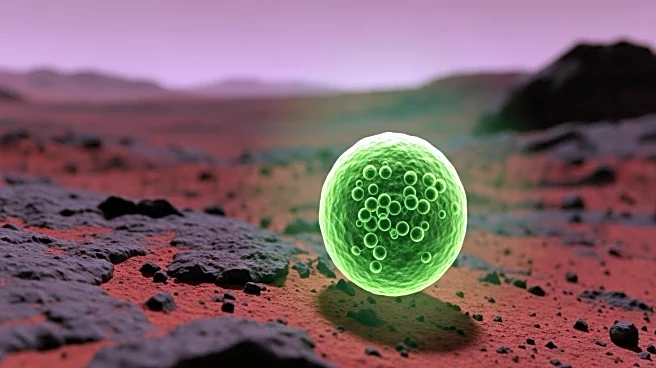What's Happening?
A cyanobacterium known as Chroococcidiopsis, referred to as Chroo, has shown remarkable capabilities in surviving extreme conditions and producing oxygen, making it a promising candidate for astrobiology research. Studies have demonstrated Chroo's ability to endure harsh environments, such as those found in outer space, and its potential to thrive on Martian soil. Experiments conducted on the International Space Station revealed that Chroo can survive UV radiation and gamma radiation, with its DNA repair mechanisms effectively mitigating damage. Additionally, Chroo can produce oxygen using Martian soil and photosynthesis, even in the presence of perchlorates, which are typically harmful to Earth-based life forms.
Why It's Important?
The ability of Chroo to produce oxygen on Mars has significant implications for future space exploration and colonization efforts. Oxygen production is crucial for sustaining human life and supporting long-term missions on Mars. The microbe's resilience to extreme conditions also offers insights into the potential for life on other planets and the development of life-support systems in space habitats. Furthermore, Chroo's capabilities could aid in the search for extinct life on Mars, as its biomarkers remain detectable even after exposure to lethal radiation levels. This research contributes to the broader understanding of extremophiles and their applications in astrobiology.
What's Next?
Future missions aim to explore additional aspects of Chroo's capabilities, including its DNA repair processes in microgravity and its ability to utilize far-infrared light for photosynthesis. These studies could enhance our understanding of life around M-dwarf stars and inform the development of sustainable life-support systems for space exploration. The continued research on Chroo may lead to practical applications in creating oxygen-rich environments on Mars, supporting human colonization efforts, and advancing astrobiology research.
Beyond the Headlines
The study of extremophiles like Chroo raises ethical and environmental considerations regarding the introduction of Earth-based organisms to extraterrestrial environments. Researchers must carefully assess the potential impacts on Martian ecosystems and ensure that space exploration efforts do not inadvertently harm or contaminate other planets. Additionally, the long-term implications of utilizing extremophiles for oxygen production and other life-support functions in space habitats warrant further exploration and discussion.









